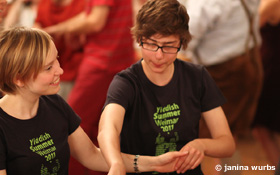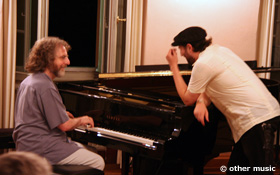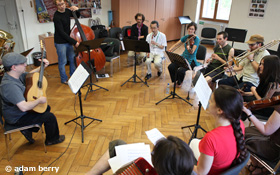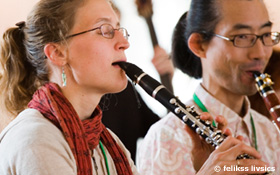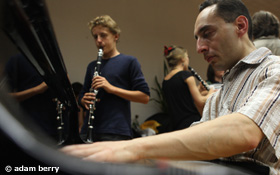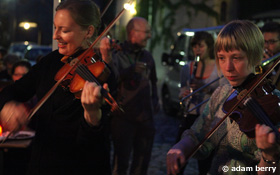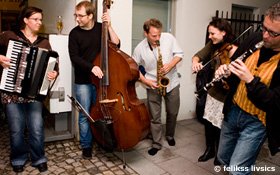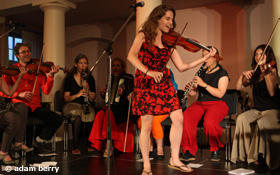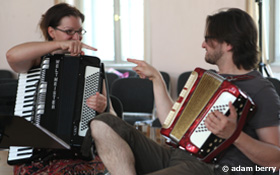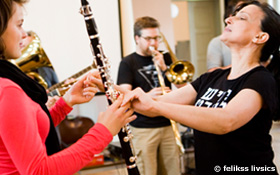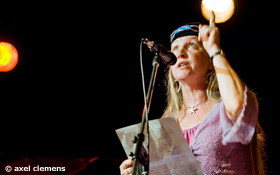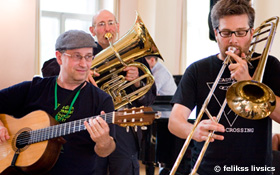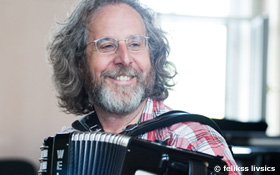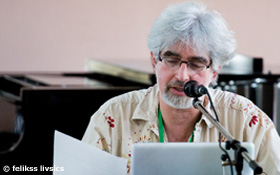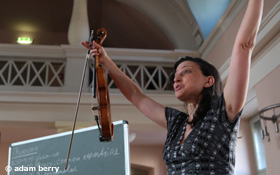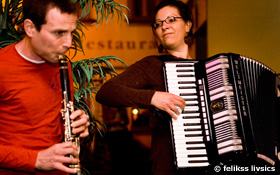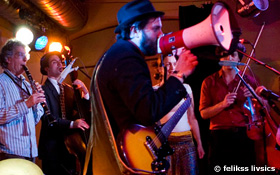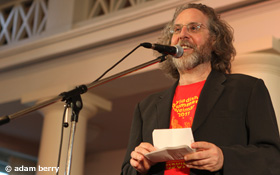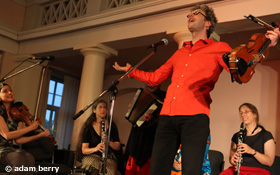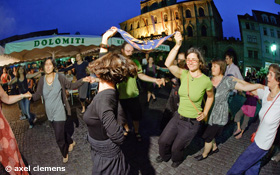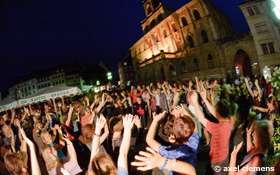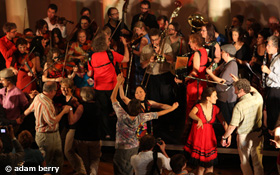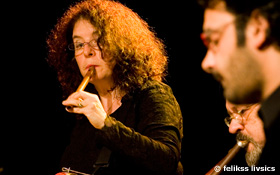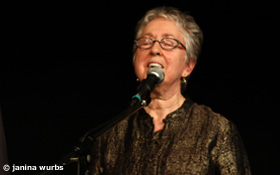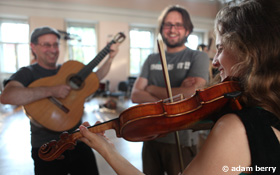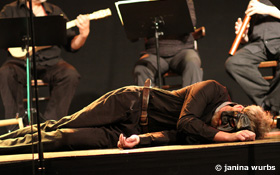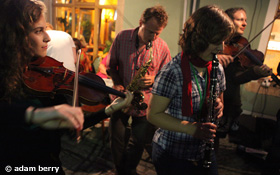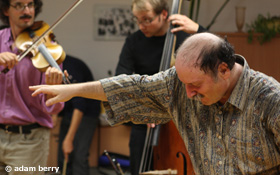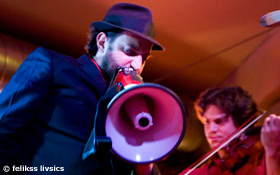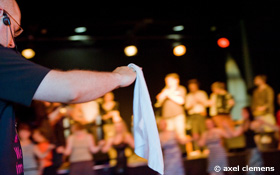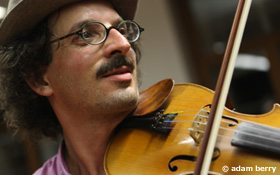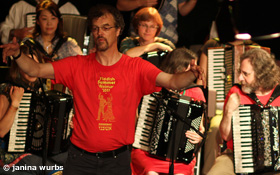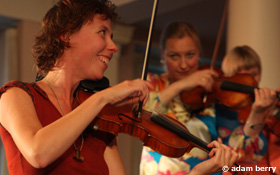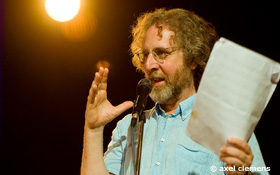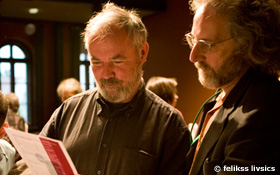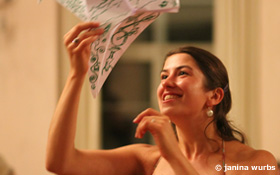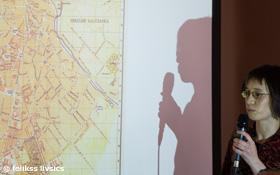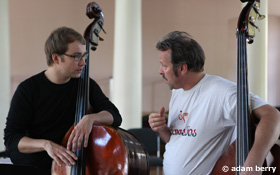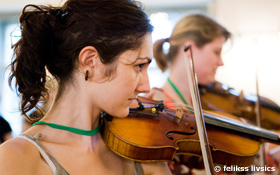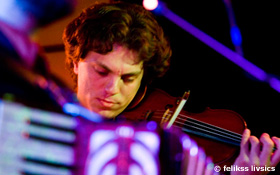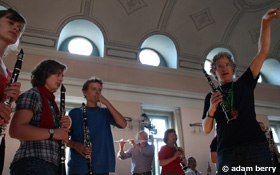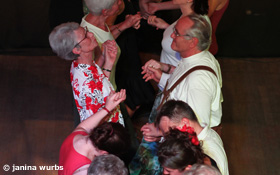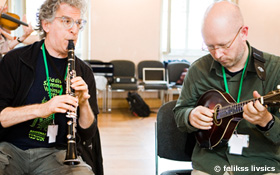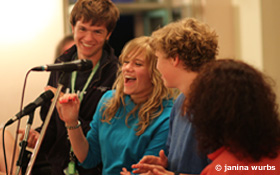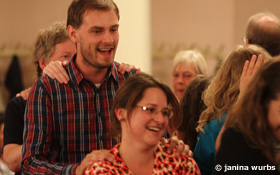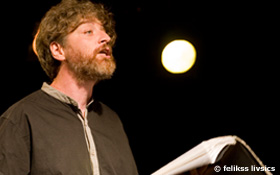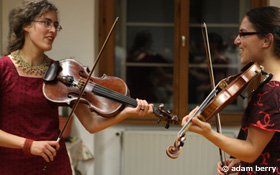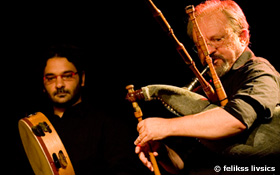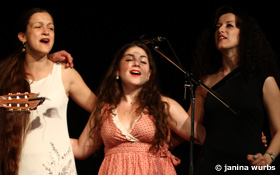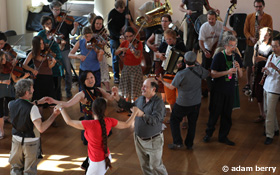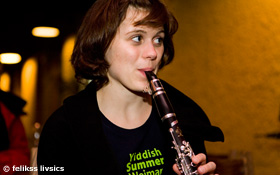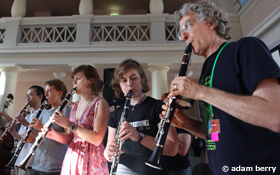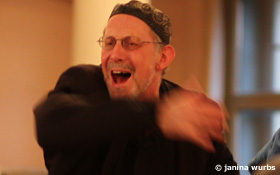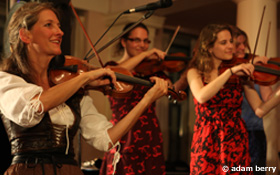What is Yiddish Summer Weimar (YSW)?
YSW is one of the most highly regarded festivals for Jewish music and culture in the world. Our vision goes still further, though, and we don't limit ourselves to "only" klezmer music. For more information about what makes us unique, see the "Our Philosophy" on our website.
Where and when does YSW take place?
Every summer in July and August in Weimar, Germany.
What kind of recognition has YSW received?
In recent years, we were awarded the 1st prize for intercultural and intergenerational music activity by the national German Music Council. We were also selected as one of the "Compass 36" by the Westbury Group (www.compasseurope.org), awarded to the 36 "most vital, innovative and effective European institutions" carrying out projects with Jewish subjects.
Who runs YSW?
YSW is run by the charitable organization, other music e.V.. You can find information about our mission and bylaws and how to become a member: www.othermusic.eu
Who can participate in YSW?
There are many workshops, concerts, jam sessions and other events that are aimed at everybody. The workshops are organized by level of experience and expertise, from beginning to advanced and professional musicians. If you're not sure what level is right for you, please feel free to ask us for advice.
Who teaches the YSW workshops?
The corps of teachers comprises only professional and highly qualified artists and scholars, including instrumentalists, vocalists, dancers, musicologists, linguists and more, who work primarily in teams and understand teaching and learning as an interactive dialogue between teachers and students, not a one-way street.
What happens in a workshop?
Typically, several subjects are covered each day. Music theory, instrument classes, ensembles, orchestra, master classes, discussions and movement/awareness work are often important elements of a workshop. In the evenings, public jam sessions in the historic outdoor cafés of Weimar take place, a perfect and supportive chance to try out some of the things taught during the day in the workshop. The actual learning process in each workshop is the most important guide to what happens, allowing both the students and the teachers to go deeply into a subject together.
How demanding are the workshops?
The workshops are meant to be intensive, and they are! Workshops hours are from 9:30 am to 1 pm, from 3 pm to 6 pm, and then from 8 pm to "closing time," usually after 10 pm, depending on the mood and energy of the official and unofficial jam sessions. Over the course of an 8-day workshop, the total instruction time adds up to at least 50 hours, in other words, the equivalent of almost 4 semesters of a university level course!
What are the times of arrival and departure?
We recommend that you arrive the evening before the day your workshop begins. If you want to arrive the same day the workshop begins, please be sure to arrive no later than 9 am. We recommend that you depart the day after the workshop ends.
Where do the workshops take place?
All of the workshops and most of the concerts take place in Weimar. Workshops take place either in the "Ottmar Gerster Music School," Karl-Liebknecht-Str. 1, or in the gymnasium in the Meyerstrasse. Concerts usually take place either in the Music School or in the culture center "mon ami." You will receive complete information along with your confirmed registration and any changes will be announced during the workshops.
Accomodations in Weimar
Each participant is responsible for his/her own accomodation arrangements. But we're glad to recommend hotels, hostels and pensions that act as our partners. Please see the link "Accomodations."
Eating out in Weimar
Participants have time in the breaks to go out to eat or to eat food they bring themselves. There are many good and relatively inexpensive places to eat close to the workshop venues, including also organic and vegetarian food. Unfortunately there are no kosher restaurants in Weimar.
Are there also continuing courses?
All courses build off of each other and are the result of the experiences from previous courses, however only certain courses specifically require that you have attended previous workshops.
Can I receive a certificate of participation?
Every participant who wishes can receive an acknowledgement of participation based on the length and content of the workshops taken.
How do I apply?
Fill out the registration form for the workshops. Be sure to apply the appropriate rebates. Send the completed and signed form to us either by email: registration@othermusic.eu, by fax +49 3643 804836, or by post other music e.V.| Ernst-Kohl-Straße 23 | 99423 Weimar.
Please note that your registration is only valid and binding after the receipt of payment.
Is there a rebate if I take part in more than one workshop?
When participating in a workshop longer than 3 days, the fee is reduced from the 4th day by 15€ and from the 7th day again by 5€. Workshops that last longer than 3 days already show this rebate in their price. This reduced is calculated based on the total number of days you participate in workhops during Yiddish Summer 2011. If you have any questions concerning workshop fees, feel free to contact us by email at management@othermusic.eu or by phone at +49 3643 858310.
Is there an Early Bird rebate?
Yes. If you register and submit payment before June 10, 2012, you will receive a discount of 20€. Please note that your registration is only valid after the complete course fee has been received. You will then receive a written confirmation of your registration. If you have any questions, be sure to contact us by email at management@othermusic.eu or by phone at +49 3643 858310.
Is there a rebate for other music e.V. members?
Yes. Every member receives a one-time discount of 25€ for Yiddish Summer Weimar 2012. If you have any questions, be sure to contact us by email at management@othermusic.eu or by phone at +49 3643 858310.
Can I pay the registration fee in installments?
The registration is only valid when the complete fee has been received by us. However, if it is not possible for you to send the complete fee at once, please contact us directly by email at management@othermusic.eu or by phone at +49 3643 858310.
Can I pay you in cash and in person?
No. It is unfortunately no longer possible to pay in cash from 2011. In order to successfully plan the festival, we must guarantee the number of registrations a number of months in advance. We also maintain the right to withhold administration fees and/or the complete course fee in the event of cancellations. If it's impossible for you to pay the fees online, please send an email to management@othermusic.eu or call us to explain your situation and we will try to work something out. We thank you for your support and understanding.
Will I receive a refund of my course fees if I am unable to attend?
You can cancel your registration any time before June 10, 2012. In this case, you must only pay an administration fee of 25€. If you cancel between June 10 and July 1, 2012, you will only be refunded half of the course fee. After July 1 it is no longer possible to cancel unless a “replacement” participant can be found to assume your registration, in which case you will only be charged a 25€ administration fee. If no replacement is found, no refund is possible.
What happens if a course is cancelled?
In order for the workshops to take place, a minimum number of participants must be registered before July 1, 2012. If this number is not reached, the other music e.V. maintains the right to cancel the workshop. All course fees will then be refunded in full. Help us to make sure that every workshop will take place by registering early. Thank you!
Is there a student rebate?
Yes. Students and people with limited financial means can, along with all other participants, choose between three course fees: “Reduced,” “Standard,” and “Supporter.” In addition, you can always apply for a scholarship.
Are there Scholarships?
Yes, every year there are also scholarships – one can apply for them directly. An internal committee decides on the award of course fee and cost of living scholarships. In return, it is expected that recipients will assist in the festival and take on certain responsibilities. The awarding of scholarships is dependent upon the yearly budget. There is therefore no legal claim to a scholarship award.
What are the criteria for awarding a scholarship?
There are a limited amount of scholarships for each course. Whoever has extremely high travel costs, for example traveling from a foreign country, cannot afford the course fees him or herself and is unable to find private financial support, for example from family members, and has not already received multiple scholarships before can apply. Additionally, you should explain to us your situation and why you require a scholarship to attend.
How do I apply for a scholarship?
To apply for a scholarship, please send an email to management@othermusic.eu explaining:
- your financial situation
- your travel plans
- your musical background (or language background, when applying for Yiddish courses)
- anything else that you think could help us understand your need for a scholarship
What is the “Supporter” fee?
Music students help each other! This fee offers you the opportunity to help worthy students with limited financial means participate in Yiddish Summer Weimar. Together, three sponsor fees contribute to create one scholarship for a deserving student. With a fee structure of 100€ per day, reduced to 85€ from the fourth day and 80€ from the seventh, you are doing good deed and directly helping your fellow musicians!
With the “Supporter” fee, participants who come from all across the world help each other and have the opportunity to learn, work together, make music and create international contacts.
What is the Other Music Academy?
It's a think tank, an educational center and a cultural platform under the direction of Dr. Alan Bern, that brings together musicians, artists, scholars and scientists from around the world to exchange ideas, create projects, teach and interact with students and others to promote an interculturaly philosophy.
Frequent Asked Questions
